Catégories
Documents disponibles dans cette catégorie (902)
 Ajouter le résultat dans votre panier Affiner la recherche
Ajouter le résultat dans votre panier Affiner la recherche
Article
A. Sattar ; S. Moulds ; C. Brown ; M. Rounsevell ; P. Alexander |Modelling interactions between climate, water, crops, and human decision-making requires coupling of biophysical and socioeconomic processes to model outcomes and explore potential futures. This study presents a novel coupled model of land-use c[...]
Article
This study presents a new way to combine the FAO land suitability framework with the Analytical Hierarchy Process (AHP) and Geographic Information System (GIS) tools to assess how suitable the land is for farming in Egypt's Western Desert, an im[...]
Article
Water diplomacy provides a way to manage shared water resources through inclusive, cooperative, and flexible methods. In the Nile Basin, the Grand Ethiopian Renaissance Dam (GERD) has become a key point of regional tension. It highlights the com[...]
Article
A.S. Hegab ; M.M.A. Wahab ; E.E. Hammad ; Y.N. Ahmed ; A.A. Khalil ; B.A.A. Ali |A WATER scarcity is one of the detrimental consequences of climate change reflected in agricultural productivity. The primary focus of this study is to investigate the profitability of maize production for smallholder farmers in Egypt, consideri[...]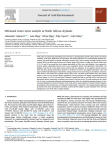
Article
A. Valjarevic ; A. Siljeg ; S. Siljeg ; F. Vujovic ; A. Sahay |North Africa is experiencing intensifying water stress due to rapid population growth, urban sprawl, and climate variability, with major implications for agriculture and human settlement in its predominantly dryland environment. This study appli[...]
Article
M. Alboghdady ; S. Abbas ; M.K. Alashry ; Y.C. Hu ; S. El-Hendawy |Egypt, the world's second-largest wheat importer, has been working hard to narrow the gap between its domestic wheat production and consumption. However, these efforts have been hampered by water scarcity and the negative impact of climate chang[...]
Article
S. Barakat ; H.I. Elkhouly ; A. Sofey ; N. Harraz |Accurate prediction of agricultural production costs is crucial for sustainable development in Egypt, where productivity is highly sensitive to fluctuating economic and environmental conditions. This study introduces a hybrid machine learning mo[...]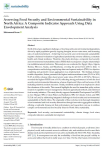
Article
North Africa faces significant challenges of food insecurity and environmental degradation, driven by rapid population growth, ongoing droughts, severe water stress, and increasing rates of undernourishment. Achieving food security and environme[...]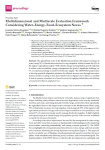
Article
L.S. Kyrgiakos ; D.D. Tosiliani ; A. Angelopoulos ; V. Bonomelli ; G. Kleftodimos ; M. Vasileiou ; C. Kleisiari ; A. Oikonomou ; P. Prosperi ; H. Belhouchette ; G. Vlontzos |The agricultural sector in the Mediterranean Basin is the largest consumer of water, using 70% of freshwater resources for crop irrigation, which accounts for 85% of the region’s agricultural output. With climate change and population growth exp[...]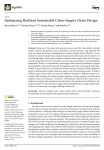
Article
Background: Growing environmental concerns and the vulnerability of global supply chains to disruptions, such as pandemics, natural disasters, and logistical failures, necessitate the design of sustainable and resilient supply chains. Methods: A[...]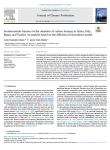
Article
The adoption of carbon farming in Mediterranean regions is crucial to mitigate the effects of climate change on agriculture. However, its implementation remains limited due to socio-economic and technical barriers. To better understand this phen[...]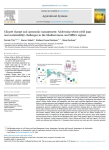
Article
CONTEXT Wheat is a crucial crop for food and nutritional security in Mediterranean and MENA regions, yet it faces significant challenges due to high yield variability, low average productivity, and substantial yield gaps. This highlights the urg[...]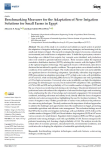
Article
The aim of this study is to construct and validate an expert system to predict the adaptation of irrigation technologies, water-saving strategies, and monitoring tools by small-scale farmers in Egypt. The research investigates the impact of econ[...]
Thèse, Mémoire, Master
M. Elsoghayer | 2025Water shortage and climate change are challenges facing sustainable wheat production in Upper Egypt. The objective of this investigation is to assess the response of wheat to an irrigation schedule and nitrogen sources at Luxor-ara conditions in[...]
Thèse, Mémoire, Master
Z. Mahmoud | 2025The thesis responds to the need for sustainable agriculture and food value chain. It considers the challenge of designing sustainable business models for small-scale farms by entering the realm of water, energy, food, and ecosystem concerns unde[...]
Thèse, Mémoire, Master
La région arabe est confrontée à des défis environnementaux, économiques et institutionnels qui freinent la transition d'une économie linéaire à une économie circulaire. Concentrée sur l'Égypte, pays fortement touché par la pression démographiqu[...]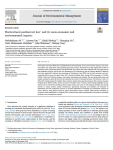
Article
A. Ali ; A. Ali ; Y. Tan ; K. Medani ; C. Xia ; N.M. Abdullahi ; I. Mahmood ; S. Yang |Food losses and waste (FLW) have multidimensional environmental, social, and economic impacts, and avoidance efforts may yield better environmental gains than recovery. Horticulture has the highest FLW (≈50% of production loss), representi[...]
Article
S..A Mohamed ; O.O.A. Maksoud ; A. Fathy ; A.S. Mohamed ; K. Hosny ; H.M. Keshk ; S.A. Mohamed |The effective management of meteorological forecasting data is crucial for enhancing agricultural sustainability and precision, especially considering climate change. This study presents an innovative framework that integrates multispectral imag[...]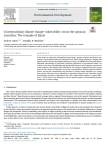
Article
In this study, we explore the relationship between Egypt's agrarian transition and farmers' perceptions of environmental risks and opportunities for climate change adaptation. Drawing from agrarian studies and rural development pathways in Egypt[...]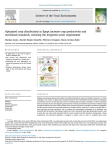
Article
M. Sardo ; D.D. Chiarelli ; F. Ceragioli ; M.C. Rulli |Feeding a growing population with healthy food while preserving the natural ecosystem's resources is a critical challenge of our century. In Egypt, the increasing demand for food commodities and the intensive consumption of freshwater resources [...]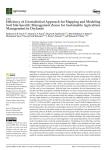
Article
I.A.H. Yousif ; A.S.A. Sayed ; E.A. Abdelsamie ; A.A.R.S. Ahmed ; M. Saeed ; E.S. Mohamed ; N.Y. Rebouh ; M.S. Shokr |Assessing and mapping the geographical variation of soil properties is essential for precision agriculture to maintain the sustainability of the soil and plants. This study was conducted in El-Ismaillia Governorate in Egypt (arid zones), to esta[...]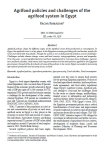
Article
Agrifood policies shape the different stages of the agrifood sector from production to consumption. In Egypt, the agrifood system is a key player in the Egyptian economy providing jobs and income, mainly for rural and vulnerable households. Thou[...]
Article
Si l’Égypte est le premier producteur africain de blé, il est également le premier importateur de cette céréale dans le monde. Sur les 20 millions de tonnes consommées chaque année dans le pays, plus de la moitié proviennent des marchés internat[...]
Article
We examine the perceived business risks and impacts on performance associated with the Russian aggression in Ukraine in February 2022 among 450 Egyptian small and medium-sized agrifood enterprises. Our analysis identifies six distinct clusters o[...]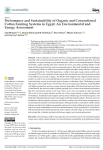
Article
Cotton cultivation is resource-intensive, posing significant environmental challenges, especially with conventional farming methods. Growing interest in sustainable agriculture drives the exploration of organic farming as a potential alternative[...]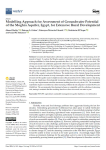
Article
Groundwater-dependent cultivation is imperative to meet the ever-increasing food demands in Egypt. To explore the Moghra aquifer?s potential, where a large-scale rural community is being established, a finite element groundwater flow (i.e., FEFL[...]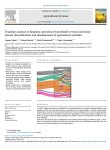
Article
A. Sattar ; C. Brown ; M. Rounsevell ; P. Alexander |CONTEXT Egyptian agriculture is challenged by increasing demands from a rapidly expanding population, and insufficient water and arable land resources, exacerbated by the expected impact of climate change further reducing these resources. Recent[...]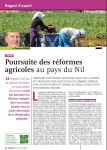
Article
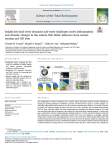
Article
Y.M. Youssef ; K.S. Gemail ; H.M. Atia ; M. Mahdy |The destabilization of delta's worldwide due to climate change and human activities presents challenges in meeting the growing demands for freshwater and food. The Nile Delta in Egypt is a prime example of a vulnerable region facing various stre[...]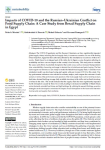
Article
The COVID-19 pandemic and the Russian-Ukrainian war have significantly impacted global supply chains, including the food supply chain, in numerous countries. As one of the leading wheat importers, Egypt has been adversely affected by the simulta[...]










